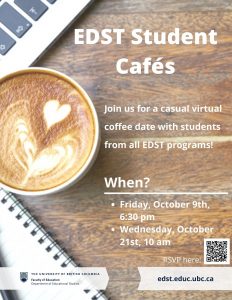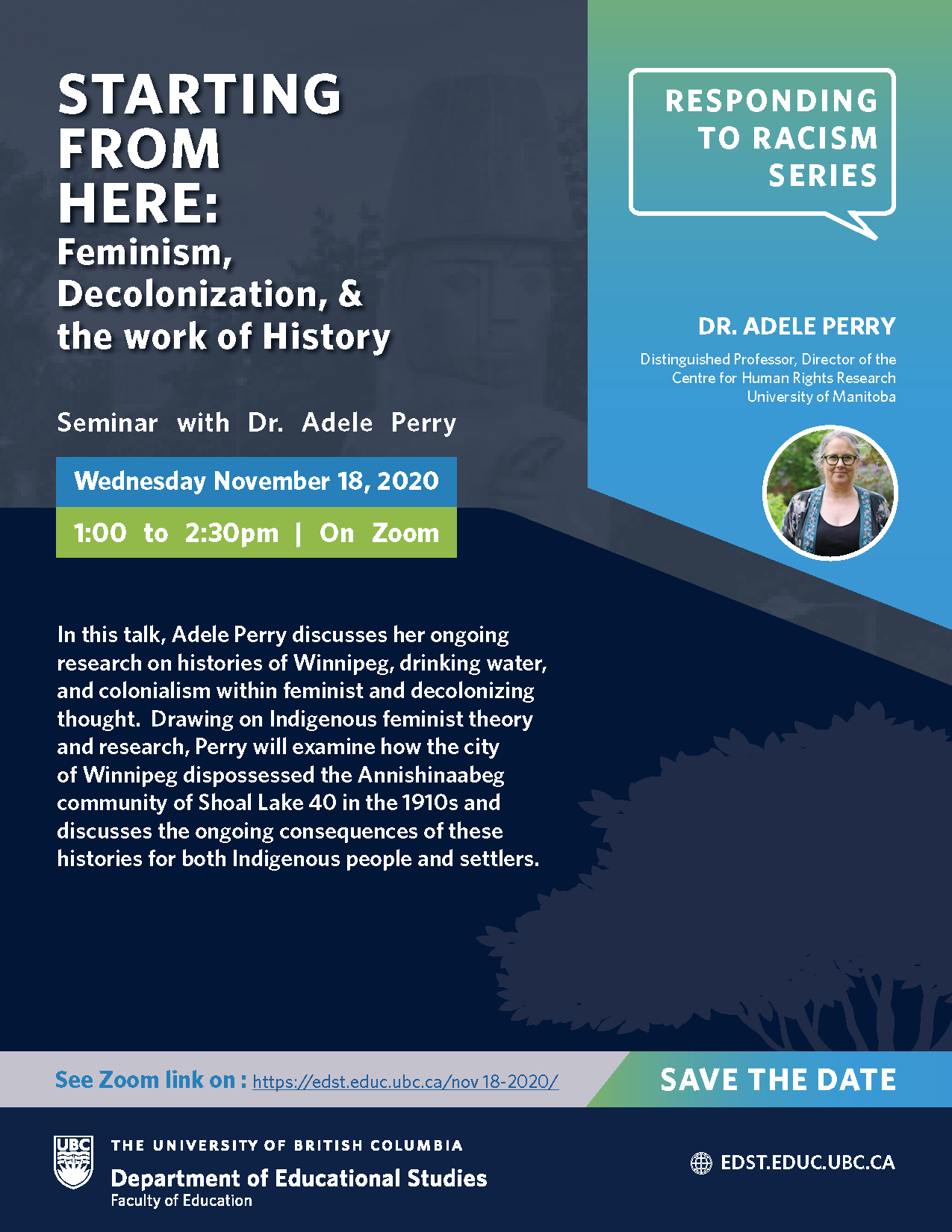Dec 01, 2020
https://pwias.ubc.ca/event/book-launch-course-syllabi-in-faculties-education
Nov 20, 2020
Dec 01, 2020
Center for Culture, Identity & Education
Webinar Roundtable
(Co-Sponsor: Adult Learning and Education Program, Department of Educational Studies)
Date: December 1, 2020
Time: 11:00am – Noon
Venue: online webinar
Topic: Cities as Sites for Transformative Change: How and Why Universities Can Contribute
Zoom link: https://ubc.zoom.us/j/66349618562?pwd=cnE4YUxReStUMlczTFpUZzhTMktEUT09
Meeting ID: 663 4961 8562
Passcode: 285524
The Centre for Culture, Identity & Education https://ccie.educ.ubc.ca invites you to attend an online webinar roundtable:
Cities as Sites for Transformative Change: How and Why Universities Can Contribute
Current global complexities call for fundamental shifts in the ways in which society operates. From the climate emergency to ongoing colonialism and institutional racism, to increased conflict and mass migration of refugees, this period demands that we envision new approaches to solving these complex problems. As institutions that exist for the public good, Higher Educational Institutions (HEIs) have a responsibility to contribute to this shift, particularly through fostering strong relationships with external actors. One of these actors is municipal governments, which need to re-envision their roles and approaches to addressing the current pressing issues.
The presenters recent and SSHRC-funded project, entitled “Transforming city governments in response to disruptive change: meeting the challenges of colonization, inequity, and climate change,” is an example of collaborative efforts between UBC and municipal governments that seeks to understand how Canadian cities can transform as they address the complex challenges of colonization, inequity and climate change. Preliminary insights indicate that city staff are under pressure to deliver on set priorities and timelines with little time and resources to reflect on the theories, paradigms and worldviews that inform their decision-making. Through a learning journey, city staff, community partners and researchers will work to unearth the structures within which cities operate and test alternative ways of defining and solving problems. This collective journey will explore questions such as: What histories have shaped our institutions? What processes have led to the erasure of ethno-cultural groups such as Black communities? How can we decolonize our practices? What collaborations are needed for shared decision-making? And what are the enabling conditions for transformative change?
A panel of UBC researchers and City of Vancouver staff will trace how their diverse and unique journeys and experiences brought them together to explore the questions of transformative change in both municipal governments and university programming. The discussion centers on how their positionality and intersecting identities as Indigenous, Black, and white community members, researchers, city staff, among others, come to bear in their research and how others can foster sustained and mutually beneficial relationships in solving current global challenges.
Discussion Format:
- Arrival and Land Acknowledgement- Kyla Pascal (5 mins)
- Rob VanWynsberghe– Introduction to Topic, Context and Panel (10 mins)
- Mumbi Maina and Maggie Low – Presentations (10 mins. each)
- Question & Answer session (10 mins)
- Call to Action for HEIs (faculty, staff and students) in fostering relationships with municipal governments across the country (5 mins)
- Thanks and Closing Remarks (5 mins)
Bios (alphabetical):
Maggie Low is an Assistant Professor at the School of Community and Regional Planning (SCARP) at the University of British Columbia (UBC), where she is the Co-Chair of the Indigenous Community Planning master’s concentration. Maggie is a community-engaged scholar who seeks to advance a better understanding of Indigenous sovereignty as it is expressed outside the Canadian courts, with a focus on the implications of these expressions for the well-being of Indigenous communities. Her current research and teaching focus on Indigenous planning, Indigenous-state relations and reconciliation in cities. Maggie has mixed ancestry, including Italian, French and German from her mother’s side. From her father’s side she is French, English and a status member of Wikwemikoong Unceded Territory.
Mumbi Maina is a Postdoctoral Fellow in the Department of Educational Studies at the University of British Columbia (UBC) and a Social Planner in the Social Policy and Projects Division at the City of Vancouver. Mumbi’s work has focused on grassroots social and environmental justice organizing, anti-racist education and cross-cultural collaboration with immigrant and other communities across North America. Her recently completed doctoral program focused on the uptake of sustainability in Canadian higher education, examining how various actors, including historically marginalized groups, are involved in the enactment of sustainability in policy and practice. Her published work covers topics such as sustainability in higher education, intersectionality in environmental education and newcomers’ roles in reconciliation. Mumbi was the first Equity, Diversity and Inclusion Fellow in the Sustainability Group at the City of Vancouver and in her current position as a Social Planner she works to imagine how municipal governments can effectively tackle the challenges of rising social and environmental inequities that are emblematic of many metropolitan cities across the globe. This work uses decolonizing, racial equity, and intersectional approaches to transform City policies, practices and processes.
Kyla Pascal is a Métis, Black woman born and raised in Amiskwaciwâskahikan (Edmonton, Alberta). Over the years Kyla has worked with a number of non-profit organizations focusing on anti-oppression, advocacy, and community-building. Her experiences and interests are centred around Indigenous solidarity, sustainability, community health, and food justice. The goal of her work is to build more resilient, just, and healthier communities. She currently works at Indigenous Climate Action, is a member of the Indigenous art collective, nipahimiw, and is a first-year graduate student with the School of Community and Regional Planning at UBC.
Rob VanWynsberghe is an Associate Professor in the Department of Educational Studies at the University of British Columbia (UBC). His primary area of research studies meaningful articulations between classrooms and communities, especially as influenced by the social philosophies of pragmatism. A book on the topic was published in 2014. His work has been supported by grants from the Social Sciences and Humanities Research Council of Canada, UBC’s Teaching and Learning Enhancement Fund, and the International Olympic Committee. Recent publications include “Adaptive Education Applied to Higher Education for Sustainability” (International Journal of Sustainability in Higher Education); “Conceptions of Sustainability within the Redesigned K-12 Curriculum in British Columbia, Canada: Mapping a Disputed Terrain” (Journal of Sustainability Education) and; “Green jobs for the disadvantaged: an analysis of government policies in British Columbia” (Journal of Environmental Planning and Management). Since 2016, he has researched and designed the first ever sustainability cohort in the teacher education program in UBC. In addition, he also launched a Masters’ program in Education for Sustainability, which partners with the City of Vancouver on the implementation of sustainability, health, housing and planning policy.
https://www.robvanwynsberghe.ca/
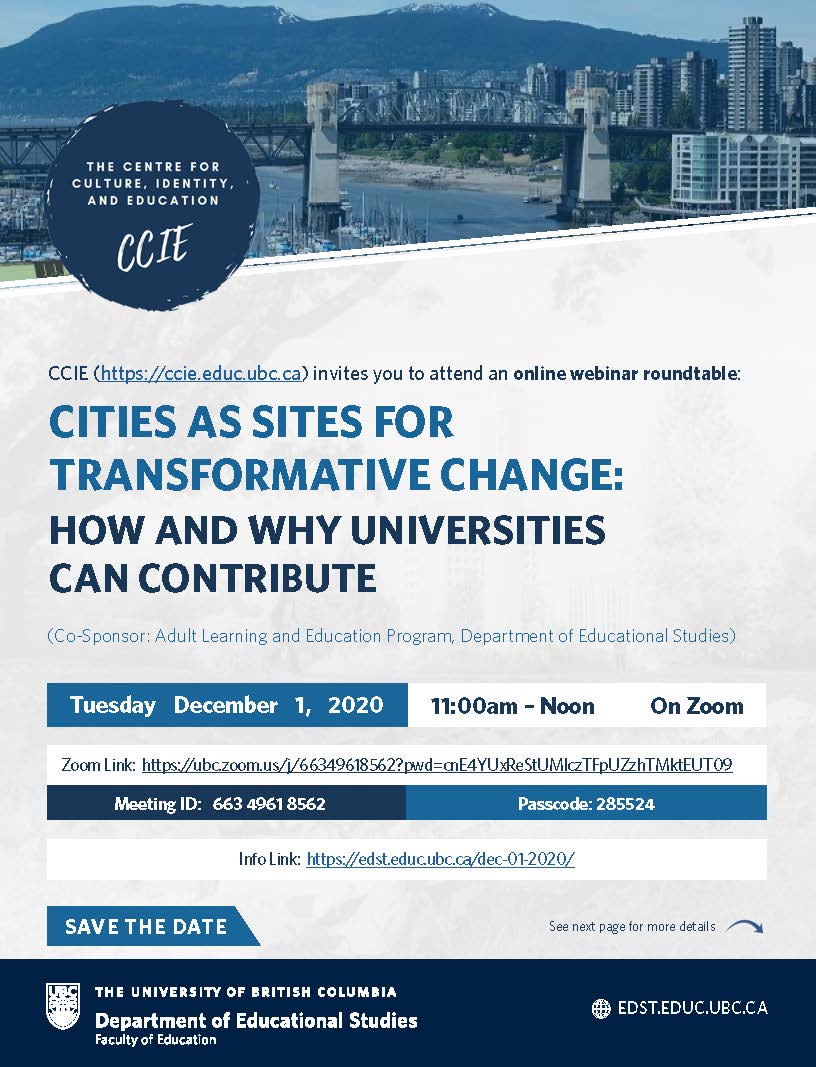
Nov 15, 2020
Nov 26, 2020
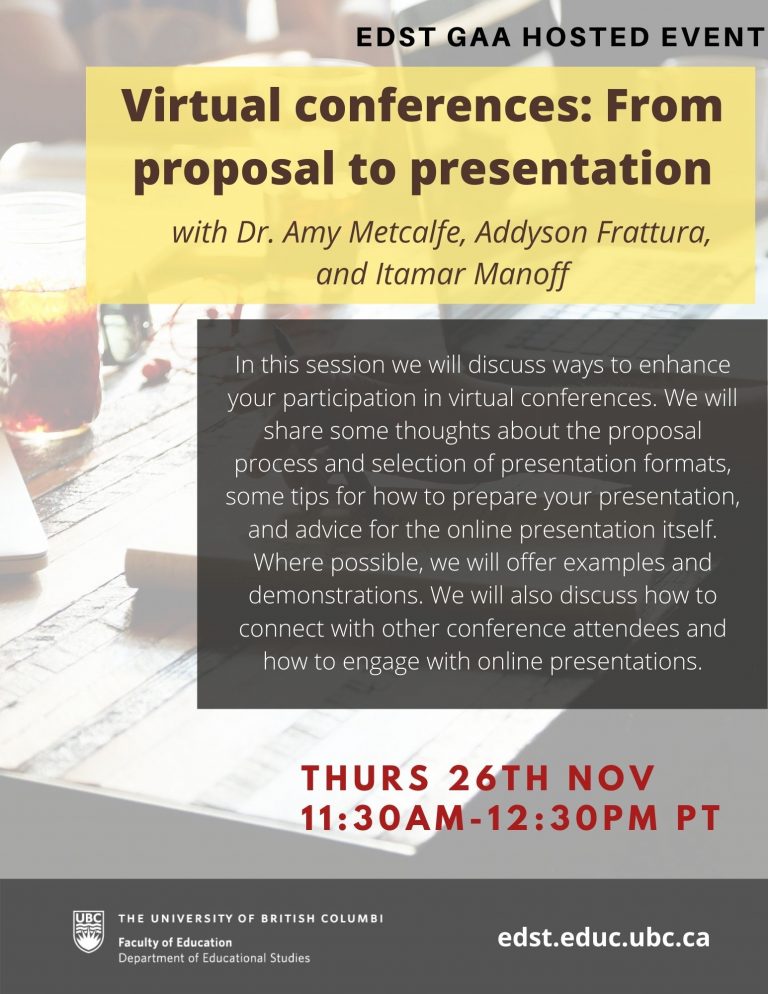
Nov 05, 2020
Nov 19, 2020
Meetup for EDST MA Students
Date and time: Thursday November 19th at 9:00 – 10:00 am PT
Location: Virtual (Zoom)
Description: Though we do not currently share the same physical space – the campus corridors and hallways – we can still share a cup of coffee or warm drink. Grab your drink and join us for a virtual chat. The meetup offers an exciting space for interactions among all MA students for the purpose of getting to know each other, asking questions and exchanging experiences. There will be an opportunity for new MA students to meet each other as well as interact with other MA students and GAAs.
Please RSVP if you plan to attend. Please send any questions to your GAA team at edst.gaa@ubc.ca

Nov 02, 2020
Nov 18, 2020
Responding to Racism Series
Starting from Here:
Feminism, Decolonization, & the work of History
Speaker: Dr. Adele Perry, Distinguished Professor, Director of the Centre for Human Rights Research
University of Manitoba
Wednesday November 18, 2020
1:00 to 2:30pm Pacific Time
Join Zoom Meeting – https://ubc.zoom.us/j/66399993640?pwd=aDNEVUJGemVvQUVIMGhXQWFqY2k5UT09
Meeting ID: 663 9999 3640
Passcode: 195433
In this talk, Adele Perry discusses her ongoing research on histories of Winnipeg, drinking water, and colonialism within feminist and decolonizing thought. Drawing on Indigenous feminist theory and research, Perry will examine how the city of Winnipeg dispossessed the Annishinaabeg community of Shoal Lake 40 in the 1910s and discusses the ongoing consequences of these histories for both Indigenous people and settlers.
Oct 09, 2020
Jan 12 & 19, 2021
The Enoch Turner Schoolhouse Foundation is thrilled to announce a new series:
‘OPENING THE SCHOOLHOUSE TO ALL’
FOUR STIMULATING TALKS, FREE TO THE PUBLIC
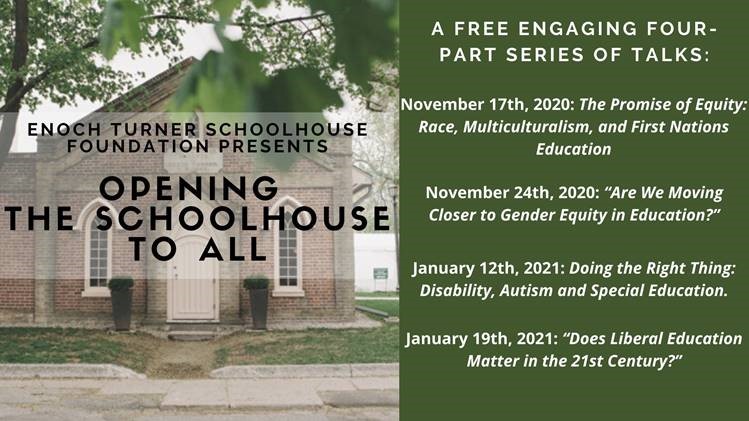
All sessions begin at 7 P.M.
These topics will be taken up in a four-part ZOOM series, sponsored by the Enoch Turner Schoolhouse Foundation, which begins in November 2020 and will continue in January 2021. The sessions feature presentations and panel discussions on a range of important educational themes. The series, free of charge, and accessible online, is designed for a broad audience interested in the past, present and future of Canadian education.
For further information on each session please see the Program Brochure below.
University/College professors and high school teachers may well want to encourage their students to register for one or more session(s) in the series.
Registration for the first session is open! Register now
OR
For more information and to stay up to date on registration please click here to visit our webpage
OR
Feel free to send inquiries to info@enochturnerschoolhouse.ca
OPENING THE SCHOOLHOUSE TO ALL
4 STIMULATING TALKS, FREE TO THE PUBLIC
SPONSORED BY THE ENOCH TURNER SCHOOLHOUSE FOUNDATION
By law and custom, everyone in Canada attends school. Some two-thirds of Canadians have been to college or university, among the highest participation rates in the world. Yet the achievement of full and equal access to schooling is an ongoing and unfinished project.
How has the pursuit of wider educational opportunity evolved historically? How do educational experiences vary by race, gender, neighbourhoods, and disabilities? What kinds of teaching and learning will best serve individuals and communities in the years ahead? How is the COVID-19 affecting access to schools and the experiences of students, teachers, and families?
These and other questions will be taken up in a four-part ZOOM series, sponsored by the Enoch Turner Schoolhouse Foundation, which begins in November 2020 and will continue in January 2021. The sessions feature presentations and panel discussions on a range of important educational themes. The series, free of charge, and accessible online, is designed for a broad audience interested in the past, present and future of Canadian education.
Speakers include academics, teachers, and community leaders whose work, writing, and public engagement have enhanced our understanding of the schooling world.
The first session (November 17) explores The Promise of Equity: Race, Multiculturalism, and First Nations Education, and features panelists: Carl James, Jean Augustine Chair in Education, Community and Diaspora at York University; Natasha Henry, President of the Ontario Black History Society; University of Toronto’s, Rob Vipond, author of Making a Global City: How One School Embraced Diversity; and Ryerson University historian, Ian Mosby, a specialist in the study of indigenous health and the politics of settler colonialism. The session will be chaired by University of Toronto historian, Funké Aledejebi, author of the forthcoming book, Schooling the System: A History of Black Women Teachers.
Session Two (November 24) asks Are We Moving Closer to Gender Equity in Education? Former Premier and Minister of Education, Kathleen Wynne, will be joined on the panel by University of Waterloo Professor Kristina Llewellyn, author of Democracy’s Angels: The Work of Women Teachers; Toronto teacher Sachin Maharaj, a Toronto Star contributing columnist; and Jane Gaskell, former Dean of OISE-University of Toronto, and author of numerous publications on gender and education.
The third Session (January 12, 2021) is entitled: Doing the Right Thing: Disability, Autism and Special Education. Panelists include University of British Columbia Professor, Jason Ellis, author of A Class By Themselves: The Origins of Special Education in Toronto and Beyond; Natalie Spagnuolo from the Council of Canadians with Disabilities, and co-founder of Memory Witness and Hope: Sharing Stories About Surviving Institutions; Gillian Parekh, Canada Research Chair: Inclusion, Disability and Education at York University; and Margaret Spoelstra, President of Autism Ontario.
The final session (January 19) turns to higher education, and asks “Does Liberal Education Matter in the 21st Century?” Lorna Marsden, former President of York University, is joined on the panel by Paul Gooch, past president of Victoria University in the University of Toronto and author of Course Correction: A Map for the Distracted University; the University of Waterloo’s Ian Milligan, author of History in the Age of Abundance? How the Web is Transforming Historical Research; and Qiang Zha, York University professor, and co-editor of International Status Anxiety and Higher Education: The Soviet Legacy in China and Russia.
Through provocative questions and informed discussion, the series will probe the achievements, limitations and prospects of schooling and higher education in disquieting times.
Series Co-ordinators:
Paul Axelrod, Professor Emeritus, York University
Jason Ellis, Associate Professor, University of British Columbia
This series is free! Register now and let others know.
Send queries to info@enochturnerschoolhouse.ca
Nov 17 & 24, 2020
The Enoch Turner Schoolhouse Foundation is thrilled to announce a new series:
‘OPENING THE SCHOOLHOUSE TO ALL’
FOUR STIMULATING TALKS, FREE TO THE PUBLIC

All sessions begin at 7 P.M.
These topics will be taken up in a four-part ZOOM series, sponsored by the Enoch Turner Schoolhouse Foundation, which begins in November 2020 and will continue in January 2021. The sessions feature presentations and panel discussions on a range of important educational themes. The series, free of charge, and accessible online, is designed for a broad audience interested in the past, present and future of Canadian education.
For further information on each session please see the Program Brochure below.
University/College professors and high school teachers may well want to encourage their students to register for one or more session(s) in the series.
Registration for the first session is open! Register now
OR
For more information and to stay up to date on registration please click here to visit our webpage
OR
Feel free to send inquiries to info@enochturnerschoolhouse.ca
OPENING THE SCHOOLHOUSE TO ALL
4 STIMULATING TALKS, FREE TO THE PUBLIC
SPONSORED BY THE ENOCH TURNER SCHOOLHOUSE FOUNDATION
By law and custom, everyone in Canada attends school. Some two-thirds of Canadians have been to college or university, among the highest participation rates in the world. Yet the achievement of full and equal access to schooling is an ongoing and unfinished project.
How has the pursuit of wider educational opportunity evolved historically? How do educational experiences vary by race, gender, neighbourhoods, and disabilities? What kinds of teaching and learning will best serve individuals and communities in the years ahead? How is the COVID-19 affecting access to schools and the experiences of students, teachers, and families?
These and other questions will be taken up in a four-part ZOOM series, sponsored by the Enoch Turner Schoolhouse Foundation, which begins in November 2020 and will continue in January 2021. The sessions feature presentations and panel discussions on a range of important educational themes. The series, free of charge, and accessible online, is designed for a broad audience interested in the past, present and future of Canadian education.
Speakers include academics, teachers, and community leaders whose work, writing, and public engagement have enhanced our understanding of the schooling world.
The first session (November 17) explores The Promise of Equity: Race, Multiculturalism, and First Nations Education, and features panelists: Carl James, Jean Augustine Chair in Education, Community and Diaspora at York University; Natasha Henry, President of the Ontario Black History Society; University of Toronto’s, Rob Vipond, author of Making a Global City: How One School Embraced Diversity; and Ryerson University historian, Ian Mosby, a specialist in the study of indigenous health and the politics of settler colonialism. The session will be chaired by University of Toronto historian, Funké Aledejebi, author of the forthcoming book, Schooling the System: A History of Black Women Teachers.
Session Two (November 24) asks Are We Moving Closer to Gender Equity in Education? Former Premier and Minister of Education, Kathleen Wynne, will be joined on the panel by University of Waterloo Professor Kristina Llewellyn, author of Democracy’s Angels: The Work of Women Teachers; Toronto teacher Sachin Maharaj, a Toronto Star contributing columnist; and Jane Gaskell, former Dean of OISE-University of Toronto, and author of numerous publications on gender and education.
The third Session (January 12, 2021) is entitled: Doing the Right Thing: Disability, Autism and Special Education. Panelists include University of British Columbia Professor, Jason Ellis, author of A Class By Themselves: The Origins of Special Education in Toronto and Beyond; Natalie Spagnuolo from the Council of Canadians with Disabilities, and co-founder of Memory Witness and Hope: Sharing Stories About Surviving Institutions; Gillian Parekh, Canada Research Chair: Inclusion, Disability and Education at York University; and Margaret Spoelstra, President of Autism Ontario.
The final session (January 19) turns to higher education, and asks “Does Liberal Education Matter in the 21st Century?” Lorna Marsden, former President of York University, is joined on the panel by Paul Gooch, past president of Victoria University in the University of Toronto and author of Course Correction: A Map for the Distracted University; the University of Waterloo’s Ian Milligan, author of History in the Age of Abundance? How the Web is Transforming Historical Research; and Qiang Zha, York University professor, and co-editor of International Status Anxiety and Higher Education: The Soviet Legacy in China and Russia.
Through provocative questions and informed discussion, the series will probe the achievements, limitations and prospects of schooling and higher education in disquieting times.
Series Co-ordinators:
Paul Axelrod, Professor Emeritus, York University
Jason Ellis, Associate Professor, University of British Columbia
This series is free! Register now and let others know.
Send queries to info@enochturnerschoolhouse.ca
Oct 08, 2020
Oct 29, 2020
Responding to Racism Series:
Antiracism Misconceptions: Insights from Teacher Candidates
Presentation by Dr. Bathseba Opini
With Professor Dr. Ali A. Abdi as Respondent
Thursday October 29, 1-2pm
Join Zoom Meeting — https://ubc.zoom.us/j/67180295041?pwd=UmFaVVRZVmllWTFoN0xmRWkrTSt1UT09
Meeting ID: 671 8029 5041
Passcode: 309061

Oct 05, 2020
Oct 22, 2020
The Write: A Structured Academic Writing Retreat, with Dr. Rob VanWynsberghe
Date and time: Thursday October 22nd, 9:00am-2:00pm PT
Post-retreat discussion: Thursday October 22nd, 2:00pm-3:00pm PT
Location: Virtual (Zoom)
Overview
The Write is an event, a mini- academic writing retreat designed to introduce and test our abilities to elicit the collective energy of a group to make progress in our own writing and thinking. Like any good event, the goal is achieving the liminal, a collective space that generates its own unique energy; in this case, in regards to our writing.
This is dedicated writing time in a supportive environment. Most of the time is for writing in the currently imaginary world of physically being in the same room with one another. Brief scheduled discussions between writing slots generate solutions to writing problems, research conversations and/or feedback on writing-in-progress. You can work on a range of writing projects: theses, chapters, books, reports, conference abstracts, grants, articles, research proposals, and all manner of social media. Aside from the liminal, we are seeking outcomes that include increased productivity, reduced stress, constructive conversations, heightened confidence in writing, and, of course, improved quality of writing.
Agenda
- 9-9:30am Intros, writing warm up, writing goals
- 9:30-11.00am Writing
- 11:00-11:30 am Break
- 11:30 – 12:30pm Writing
- 12.30-1:15pm Lunch/Reflection/Exercise
- 1.15-2:00pm Writing
- 2-3:00 Discussion [open to guests who cannot attend the full retreat]
Please RSVP if you plan to attend. Please send any questions to your GAA team at edst.gaa@ubc.ca
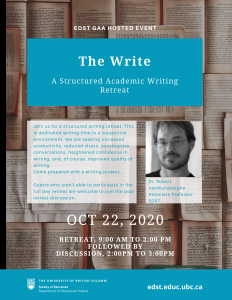
Oct 21, 2020
EDST Student Cafés
Date and time: Friday October 9th at 6:30 pm PT, and Wednesday October 21st at 10:00 am PT
Location: Virtual (Zoom)
Description: It can be difficult to get to know one another and catch up when we’re not running into each other in the halls between class, so this month the GAA team will be holding two social coffee hours. Bring your own warm drink and join us for a virtual, non-academic chat. The purpose is to meet on Zoom and hang out together, get to know people from the department who are not necessarily in your courses, and have some social time with other members of the department.
Please RSVP if you plan to attend. Please send any questions to your GAA team at edst.gaa@ubc.ca
